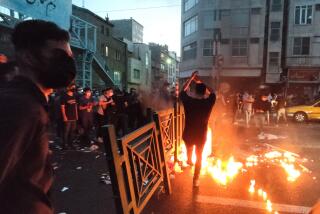Is Kadafi a Madman, as They Say? : If Repugnant, His Acts Are Predictable and Based on Principle
- Share via
Col. Moammar Kadafi’s support for terrorism, his efforts to subvert regimes throughout the world, his flouting of the norms--and laws--of international conduct have made him the target of widespread anger and scorn. President Reagan has called the Libyan leader “flaky.” The Soviets reportedly consider him a “fanatic.” Egypt’s President Anwar Sadat referred to him as “100% sick and possessed by the devil.”
Yet, despite the almost unanimous contempt in which Kadafi is held by world leaders, after nearly 17 years in power he has outlasted many of his detractors and remains a force to be reckoned with. However repugnant Kadafi’s behavior, it is not the record of a madman in any conventional sense. Far from being unpredictable, his actions and reactions are fairly easy to anticipate, as the United States demonstrated in provoking him into a military skirmish by crossing his “line of death” in the Mediterranean. Moreover, Kadafi has successfully drawn worldwide attention to himself and to what would otherwise be a small and relatively insignificant country.
Ostracized, reviled and feared, Kadafi continues to hold his own. What are his motives?
To understand Kadafi, it must be remembered that he views himself as a champion of oppressed and exploited peoples throughout the world. His ideology is quite explicit. He calls it “the third international theory” to distinguish it from communism and capitalism alike, and he expounds on it in the Green Book, the three slim volumes that he published in the 1970s. It draws both on the egalitarian ethos of Libyan tribal life and on Kadafi’s own broad if unsystematic reading in utopian, anarchist and socialist Western thought, from Jean Jacques Rousseau to Karl Marx.
Kadafi’s idiosyncratic interpretation of these different strands of thought have produced simple and radical conclusions: All forms of representative rule are perversions of true direct democracy, and all forms of profit are inherently exploitative.
The first application of these dictates has been, of course, in Libya, and, as any Libyan can attest, the implementation of such principles entails enormous upheaval. Since the late 1970s, retail trade has been abolished, all rental property has been seized, land-tenure records have been destroyed, businesses have been turned over to the employees in self-management committees--all in an effort to guarantee the absolute equality of all Libyans.
This, together with the system of popular committees and congresses through which the people are supposed to rule themselves, constitutes the substance of Kadafi’s revolution; Libya is the first example of what Kadafi calls a jamahiriya , or “state of the masses.”
And it is not supposed to be the last. This is a revolution for export. Kadafi is firmly opposed to the international status quo, which he regards as exploitative and illegitimate, and he considers its subversion a virtual obligation. It is the Libyan revolution, not the international system, that stands for justice, equality and freedom. These are firmly held principles on Kadafi’s part, and, although he has demonstrated tactical flexibility throughout his years in power, he has never compromised his ideals in response to domestic or international pressure.
Indeed, Kadafi’s self-image is that of a modern Robin Hood. His status as an international outlaw confirms the righteousness of his cause as an opponent of injustice and exploitation at home and abroad. From his point of view, domestic opposition, rather than suggesting that his policies are in any way inappropriate to Libya, merely demonstrates the continued influence of perverse and reactionary elements in the population, while foreign condemnation is only to be expected in a world dominated by imperialist powers.
Kadafi even refuses to acknowledge that Libya has profited in the international economy, arguing instead that the oil revenues earned by his country are “reparations” being paid by the industrialized countries for the damage that they, as imperial powers, have inflicted on Libya and the rest of the world.
Because these are firmly held beliefs, as long as Kadafi remains in power he will be a source of instability on the international scene. His opposition to the international status quo is an article of faith, not a response to pressure from home or abroad, and he will support radical and revolutionary movements as long as it is within his power to do so.
Because Kadafi acts on principle rather than in response to pressure, the international community--including the United States--is hard pressed to find a way to effectively change or control his behavior. Unfortunately, American saber-rattling, blustering and bullying simply serve to confirm his conviction of moral superiority and his sense of self-importance.
More to Read
Sign up for Essential California
The most important California stories and recommendations in your inbox every morning.
You may occasionally receive promotional content from the Los Angeles Times.













